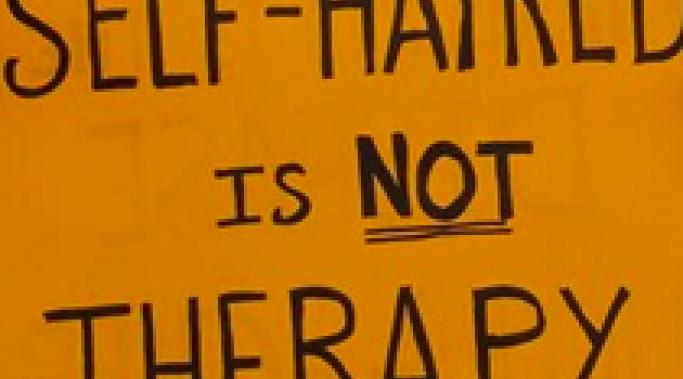Blogs
Should the U.S. ban conversion therapy? Recently, I received an email asking me to sign a petition demanding the Federal Trade Commission ban conversion therapy, also known as "reparative therapy," "ex-gay therapy," and "sexual orientation therapy." This therapy, which has been discredited by nearly every medical, psychiatric, and psychological organization, claims to be able to turn a Lesbian, Gay, Bisexual, Transgender, Questioning (LGBTQ) person into a heterosexual (Cure the Gay: Gay Conversion Therapy – Real or Hoax?). When you read what this therapy involves--the Southern Poverty Law Center claims it uses "violent role play, reenactment of past abuses, and exercises involving nudity and intimate touching" 1 --it's hard to see why it's allowed. But should the U.S. ban conversion therapy?
It has been an absolute pleasure writing for HealthyPlace and uploading videos each fortnight. Thank you to everyone who has read my blogs and watched my videos each week. I feel many blessings have come out of my mental health struggles.
I've learned about the benefits of practicing self-compassion in PTSD recovery. In my last post I talked a little bit about using self-compassion as one way of dealing with posttraumatic stress disorder (PTSD) and the shame that is associated with trauma. In this post, I want to dig deeper into how to be kind to ourselves and cultivate a practice of self-compassion to alleviate some of the symptoms of PTSD. Being kind to myself is something that I know I need to do more of, but it isn't something that comes naturally to me, and I suspect that is true for many trauma survivors. When I am able to practice self-compassion in PTSD recovery, I find that dealing with PTSD symptoms is easier and my negative self-talk and feelings are lessened.
Having schizophrenia or schizoaffective disorder in college is really hard. Getting a master’s degree is really hard, too. Dealing double duty can be a real challenge. I got my master’s degree in photography while coming to terms with my diagnosis of schizoaffective disorder. Here’s what it’s like to be in college while battling schizophrenia or schizoaffective disorder.
At times, you may want to seek support from someone else with binge eating disorder (BED). A BED support system can be vital to your recovery and talking to someone who has had similar experiences can be incredibly helpful. Support systems can also include online support from people who have binge eating disorder. The support from someone else with binge eating disorder can fit your needs exactly.
Taking responsibility for others’ happiness is a big cause of anxiety (Anxiety Causes: What Causes Anxiety?). People who are highly sensitive, caring individuals naturally want the people in their lives to be happy, to experience wellbeing. Caring for others is a character strength. However, it can easily morph into something unhealthy, where rather than wanting to contribute to others’ happiness and wellbeing, we find ourselves being people-pleasers in order to make them happy. Feeling as though we have sole responsibility for others’ happiness causes anxiety.
To have dissociative identity disorder (DID) is quite often to be one’s own worst enemy. Everyone has his/her internal dialogues and arguments and criticisms; indeed, many of us are often our own worst enemies. Dissociative identity disorder puts an intense twist on the concept. Imagine wrestling with yourself, even battling yourself, but that self isn’t actually you. But it is you at the same time. Sound confusing? It is very confusing, both for outsiders to grasp and for the people who live with it.
Anger can be tough to deal with in bipolar disorder. Some people really do find they get extremely angry often for no reason other than bipolar disorder. And, as most people know, feeling angry, and even worse, acting angrily, are not positive experiences. Here are some tips on dealing with anger in bipolar disorder.
Safe coping skills in eating disorder recovery are so important. Having an eating disorder can feel like walking around in a black hole, lost and in darkness. As we all know, simply stopping the disorder doesn’t happen overnight. In recovery, we go through a process of learning our triggers. Prior to this, we never knew when we’d be triggered and when that neural pathway would fire us down the road of our disordered patterns. In the disorder, we often had zero coping skills for emotions except the eating disorder, so, naturally, it’s the one we chose every time. In our eating disorder recovery we can develop many safe coping skills to assist us in getting, and staying, healthy.
Anxiety can make us say mean things, regrettably, no matter how nice we are. I would say that I am a nice person. Indeed, I would go as far to say that my “niceness” is often viewed as a defining characteristic to my closest friends. As far as I know myself, this isn’t just appearances. I do care deeply about people and feel a great sadness when learning about other people’s unhappiness and disappointments. I cannot bear to hear stories of loneliness and abandonment. I do not think that I have ever intended to hurt anybody or that I have ever taken pleasure in another person’s unhappiness. But I have said mean things when anxiety got the better of me.









